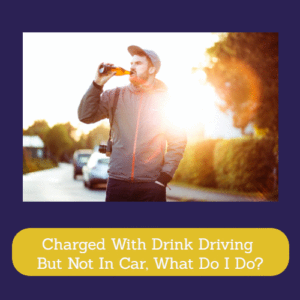 Charged with drink driving but not in car, what do I do?
Charged with drink driving but not in car, what do I do?
It’s not as uncommon as you might think to be charged with drink driving but not in the car when the alleged event happened. But what do you do if this is something that has happened to you?
To be connected to a specialist drink driving solicitor near to where you live or work, please either call us now on 0845 1391399 or complete a Free Online Enquiry.
Here is everything you need to know about what the law says in these matters and the steps you could and should be taking to handle the situation:
What Is Drink Driving?
In the UK, drinking driving is sometimes technically referred to as “being in charge of a motor vehicle while unfit to drive”.
There is a legal limit for how much alcohol you can have in your body and still be allowed to operate a motor vehicle:
- England, Wales, and Northern Ireland – 35 micrograms (mcg) of alcohol in 100 ml of breath.
- Scotland – 22 micrograms (mcg) of alcohol in 100 ml of breath.
Can You Be Charged With Drink Driving And Not Be In The Car?
Yes. That phrase “in charge of a motor vehicle” has particular importance when it comes to circumstances where you have been charged with drink driving but weren’t actually in the car.
It means that if the police and Crown Prosecution Service can prove that you were intending to drive the vehicle, you can be charged with drink driving even if you weren’t in the vehicle.
This makes it risky to have any kind of interaction with your vehicle if you are over the drink drive limit, as we’ll see below.
How Is “In Charge” Defined In UK Motoring Law?
There isn’t a set list of what counts as being “in charge of a vehicle” in UK law. In fact, the courts have historically been strangely keen to ensure there isn’t a clear definition that can be treated as a “yes or no” test.
This means the way “in charge” is defined touches on a number of factors, including:
1) Your Proximity To The Vehicle
Were you in the vehicle? If you were inside the vehicle, but not in the driving seat, you can still easily be said to be “in charge” of the vehicle.
If you weren’t inside the vehicle, how close to it were you? The further away you were – or the more difficult access would have been to achieve – the more likely it is that you can show you weren’t actually intending to use the vehicle.
2) Your Access To The Keys
Having access to your keys is probably a bad sign as far as being “in charge” of a vehicle goes. If you have access to the keys and the vehicle, there is a much higher likelihood that you will be perceived by the court as intending to use it.
3) Your Intention To Take Control Of The Vehicle (Or Otherwise)
Proving that you had no intent to take control of the vehicle can be challenging, but it is possible. However, if you had been in charge of the vehicle – for example, you’d recently been driving it – it is usually taken that you remain “in charge” unless you can clearly demonstrate that you:
- Gave your keys away or otherwise put the vehicle in someone else’s charge
- Put the car somewhere it was very difficult to access (perhaps a car park that you needed ID to enter or elsewhere entirely)
- Somehow ensured there was no possibility of you resuming control while you were unfit to drive
What Do You Do If Charged For Drink Driving But Weren’t In The Car?
1) Get Legal Advice Immediately
Being found guilty of being in charge of a vehicle can carry a heavy penalty depending on the circumstances surrounding your case. You could face:
- 10 points on your license or a driving ban
- A fine of up to £2500
- Community service
- A prison sentence of up to 3 months in the worst cases
This makes it vital to seek out a specialist drink driving lawyer as soon as possible. Only an expert in the field will be able to examine your case and the evidence against you in order to see if you have a possible defence.
2) Explore Possible Defences
According to the law, as the defendant, you need to prove that “it was more likely than not that [you] had no intention of driving”. In return, it is the prosecution’s job to prove that you were likely to intend to drive.
A specialist in motoring law will be in the best position to explore if you can assemble a case that demonstrates the former. If no defence is obvious, a further investigation and review of the evidence may open up further possibilities.
In any case, your first step in any drink driving-related case should always be to at least talk it over with an expert in this particular field of law.
Looking for just such an expert? We can help you find one – for FREE.
Find A Drink Driving Solicitor Now
To be connected to a specialist drink driving solicitor near to where you live or work, please either call us now on 0845 1391399 or complete a Free Online Enquiry.

 Solicitors specialising in drink driving – why would I need one?
Solicitors specialising in drink driving – why would I need one? What Are Hidden Assets? – Expert hidden assets solicitors
What Are Hidden Assets? – Expert hidden assets solicitors